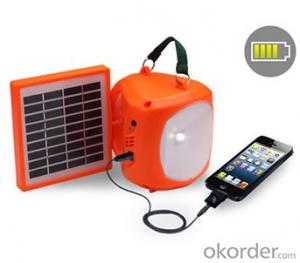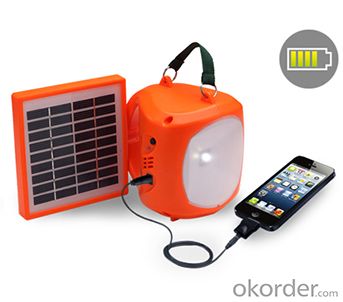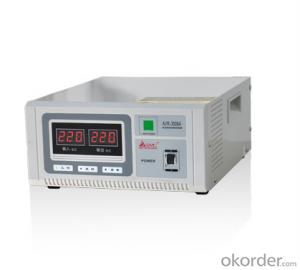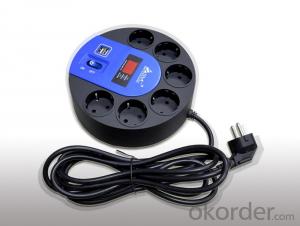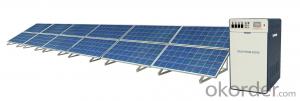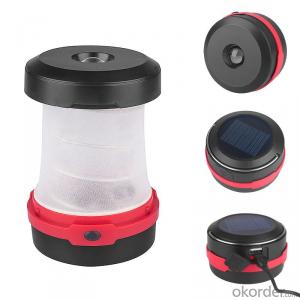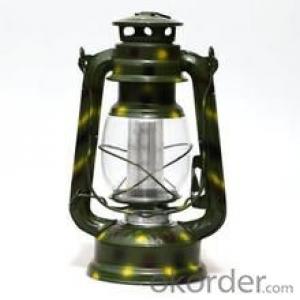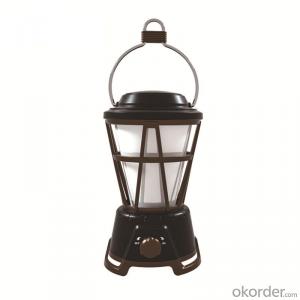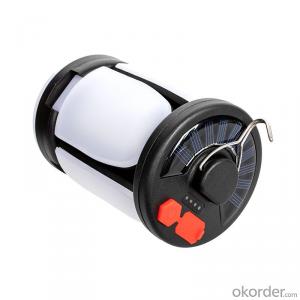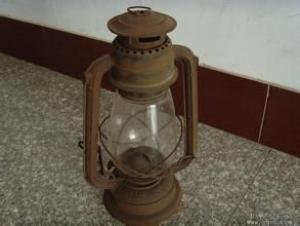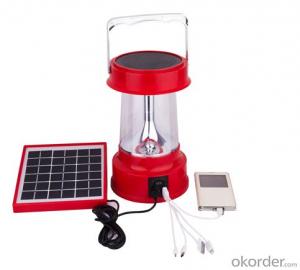Advanced Solar Energy Systems Solar Camping Lantern
- Loading Port:
- Guangzhou
- Payment Terms:
- TT OR LC
- Min Order Qty:
- -
- Supply Capability:
- 10000 unit/month
OKorder Service Pledge
Quality Product, Order Online Tracking, Timely Delivery
OKorder Financial Service
Credit Rating, Credit Services, Credit Purchasing
You Might Also Like

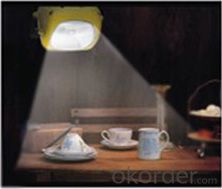
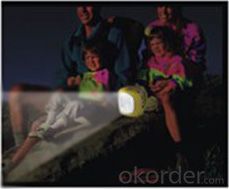
Main characteristics
1. Support two charging modes: Solar charging/ AC charging.
2. Convenient and easy to use durable with beautiful appearance.
3. 4 switches to adjust, high brightness/lower brightness/cell phone charger output/power off.
4. No wire, no installation, no hassle, fast and easy to install.
5. Green and energy saving and widely used.
Technical parameter
| Material | Transparent plastic PC/ABS |
| Solar Panel | Mono crystalline 1.5W |
| Battery | 6V/3500mAh |
| LED | 1W(1PCS) |
| Output | 5V/550mA |
| Charging Time | 10 hours charged by AC current, 22 hours charged by solar energy |
| Illumination Time | 10 hours for high brightness, 20 hours for lower brightness |
| Packing Measure | 175*140*155mm |
| Weight | 1.1KG |
| Accessories | AC Adapter/Cell phone charging cable with 3 different connectors |
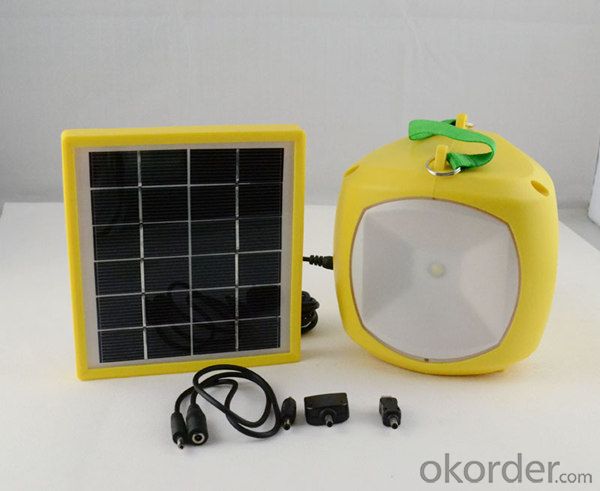
- Q: Can solar energy systems be installed on historic buildings?
- Yes, solar energy systems can be installed on historic buildings. However, it is important to consider the sensitivity of the building's preservation and design. Careful planning and collaboration with historic preservation experts are required to ensure that the installation does not compromise the architectural integrity of the historic structure.
- Q: Can solar energy be used during power outages?
- Yes, solar energy can be used during power outages. Solar panels generate electricity from sunlight, which can be stored in batteries for later use. This stored energy can then be used to power essential appliances and devices during power outages, providing a reliable source of electricity even when the grid is down.
- Q: Are there any risks of electrical short circuits with solar energy systems?
- Yes, there are risks of electrical short circuits with solar energy systems. Just like any other electrical system, solar energy systems can be susceptible to short circuits. A short circuit occurs when there is an unintended path of low resistance that allows a large amount of current to flow. This can happen due to various reasons such as faulty wiring, damaged components, or improper installation. Short circuits can result in overheating, electrical fires, or damage to the system. The high current flow generated by a short circuit can cause wires to melt, insulation to burn, and can even damage the solar panels themselves. In extreme cases, short circuits can lead to explosions or other serious safety hazards. To mitigate the risks of short circuits, it is crucial to ensure proper installation by qualified professionals who follow safety guidelines and adhere to local electrical codes. Regular maintenance and inspection of the system are also important to identify and address any potential issues. It is recommended to have a circuit breaker or fuse installed within the system to automatically disconnect the circuit in case of a short circuit. Additionally, the use of high-quality components and wiring that are specifically designed for solar energy systems can help minimize the risks of short circuits. It is also important to follow manufacturer's instructions and guidelines for system maintenance and operation. Overall, while the risks of electrical short circuits with solar energy systems exist, they can be effectively managed and minimized through proper installation, regular maintenance, and adherence to safety guidelines.
- Q: Are there any limitations to the amount of electricity a solar energy system can generate?
- Yes, there are limitations to the amount of electricity a solar energy system can generate. These limitations include factors such as the size and efficiency of the system, the amount of sunlight available, and the geographical location of the system. Additionally, external factors like weather conditions and shading can affect the system's performance and limit its electricity generation.
- Q: Can a solar energy system be installed on a hospital or healthcare facility?
- Yes, absolutely. Solar energy systems can be installed on hospitals or healthcare facilities. In fact, many hospitals and healthcare facilities are adopting solar energy as a sustainable and cost-effective solution to meet their energy needs. These systems can provide clean and renewable energy, reducing the facility's carbon footprint and operating costs. Additionally, solar energy installations can help hospitals maintain a reliable power supply during emergencies or power outages, ensuring uninterrupted patient care.
- Q: How do solar energy systems impact grid stability?
- Solar energy systems can have both positive and negative impacts on grid stability. On one hand, solar power can help enhance grid stability by reducing the strain on traditional power plants and diversifying the energy mix. Solar energy is typically generated during the day when demand is high, which can help meet peak demand and stabilize the grid. On the other hand, the intermittent nature of solar power can present challenges to grid stability, as it is dependent on weather conditions. This intermittency can lead to fluctuations in power generation, which may require additional grid management strategies and energy storage solutions to ensure stability.
- Q: Can solar energy systems be used in areas with limited access to solar energy publications and resources?
- Yes, solar energy systems can be used in areas with limited access to solar energy publications and resources. While access to information and resources can be helpful, it is not a prerequisite for utilizing solar energy systems. Basic knowledge and understanding of the technology, combined with technical expertise, can enable the installation and maintenance of solar energy systems. Additionally, local communities can seek support from experts, organizations, or government agencies to bridge the knowledge gap and ensure successful implementation of solar energy systems in such areas.
- Q: How efficient are solar energy systems?
- Solar energy systems are highly efficient as they convert sunlight directly into electricity or heat without any emissions or moving parts. They have an average efficiency of 15-20% for solar panels, but advanced technologies can achieve efficiencies of up to 40%. Additionally, solar systems can be optimally designed and integrated to maximize their efficiency and energy output.
- Q: Can solar energy systems be integrated into building design?
- Yes, solar energy systems can be integrated into building design. In fact, integrating solar energy systems into building design is becoming increasingly common and is considered a sustainable and cost-effective approach to generating electricity. There are various ways to incorporate solar energy systems into building design, including rooftop solar panels, solar facades, and solar windows. Rooftop solar panels are the most commonly used method of integrating solar energy systems into building design. They can be installed on the roofs of buildings, either as standalone structures or integrated into the roof itself. These panels capture sunlight and convert it into electricity, which can be used to power the building or be fed back into the grid. Solar facades are another way to integrate solar energy systems into building design. These systems involve installing solar panels on the outer walls of buildings. They not only generate electricity but also act as a protective layer, reducing heat gain and improving the building's energy efficiency. Solar windows are a relatively new development in building-integrated solar energy systems. These windows are designed with built-in transparent solar cells that can capture sunlight and generate electricity while still allowing natural light to enter the building. Solar windows have the potential to revolutionize building design by seamlessly integrating renewable energy generation into the building envelope. Integrating solar energy systems into building design offers several advantages. First and foremost, it allows buildings to generate their own electricity, reducing reliance on fossil fuel-based power sources and lowering utility bills. Additionally, it contributes to the reduction of greenhouse gas emissions, promoting a cleaner and more sustainable environment. Moreover, solar energy systems can enhance the aesthetic appeal of buildings, turning them into visually striking examples of sustainable architecture. In conclusion, solar energy systems can indeed be integrated into building design. With various options available, including rooftop solar panels, solar facades, and solar windows, buildings can generate their own clean, renewable electricity, reduce their carbon footprint, and contribute to a more sustainable future.
- Q: Can solar energy systems be used in powering fire stations or police stations?
- Solar energy systems have the capability to power fire stations and police stations, offering a renewable and sustainable power source that is both reliable and cost-effective. These facilities necessitate a consistent and uninterrupted power supply for crucial functions such as lighting, communication, security systems, and other essential equipment. To harness sunlight and convert it into electricity, solar panels can be installed on rooftops or nearby areas. This electricity can then be utilized to power the various electrical systems within these establishments. By employing solar energy, fire stations and police stations can decrease their dependency on traditional grid electricity, reduce operational costs, and contribute to a greener environment. Moreover, solar energy systems can incorporate battery storage to accumulate excess electricity generated during the day, ensuring an uninterrupted power supply even during periods of low sunlight or at night. Overall, solar energy systems are a practical and feasible option for powering fire stations and police stations, endorsing energy independence and sustainability for these vital public service institutions.
Send your message to us
Advanced Solar Energy Systems Solar Camping Lantern
- Loading Port:
- Guangzhou
- Payment Terms:
- TT OR LC
- Min Order Qty:
- -
- Supply Capability:
- 10000 unit/month
OKorder Service Pledge
Quality Product, Order Online Tracking, Timely Delivery
OKorder Financial Service
Credit Rating, Credit Services, Credit Purchasing
Similar products
Hot products
Hot Searches
Related keywords
